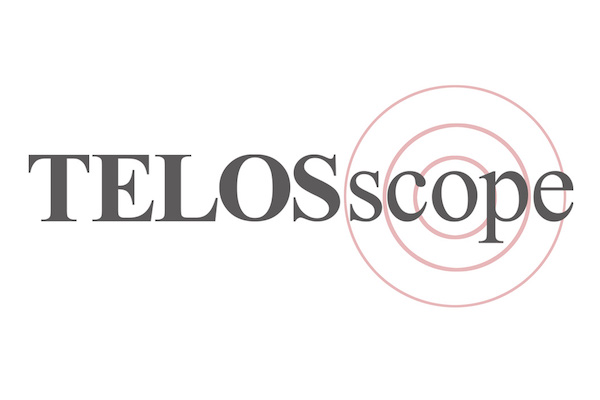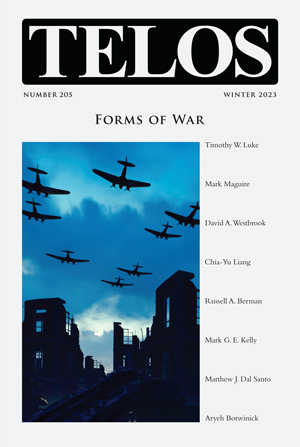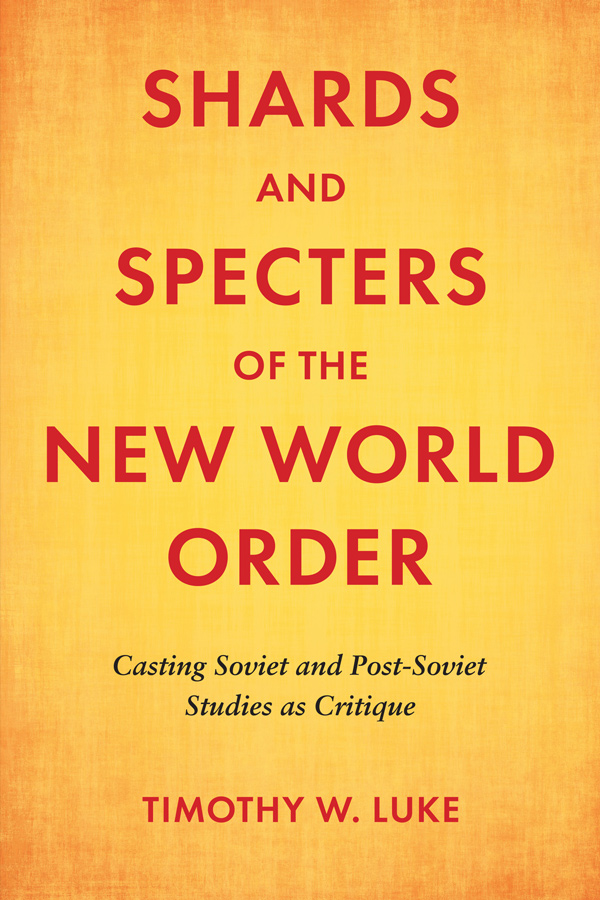By David Pan · Monday, February 12, 2024 
As much as war has become automated and mechanized, the subjective experience of the horror of war remains central to its meaning today. Russia, through its intentional bombing of civilians, and Hamas, with its massacres, have both sought to manipulate personal experience by terrorizing their enemies to achieve their war aims. Such tactics have also become the basis of their rule, in which they use fear to intimidate domestic political opponents to maintain their power. While they seek to create fear, the response of Ukrainians and Israelis alike has been to respond to subjective horror with the courage to maintain resistance while also affirming their values. War continues to be grounded in the way in which the participants’ most personal experiences can create a unified political will.
Continue reading →
By David Pan · Friday, January 12, 2024 Telos 205 (Winter 2023): Forms of War is now available for purchase in our store. Individual subscriptions to Telos are also available in both print and online formats.
 One of the most challenging aspects of the wars in Ukraine and Israel is the way in which the conflicts have been constantly shifting in form. In the first place, there is a conventional ground war between Russia and Ukraine, in which the identity and will of the two peoples are at stake. Yet Russia has used weapons supplied by Iran and North Korea, and Ukraine relies on NATO for its own supplies, indicating that this war depends on the maintenance and expansion of alliances. The stability of these alliances in turn depends on a combination of Realpolitik and shared values as the glue that holds them together. This logic of alliances motivates the energy war that Russia is waging with Europe, revealing that, unbeknownst to Europe, Russian energy policy over the last decade was an early form of the war. Similarly, the threat of nuclear war also tests the resolve of NATO, forcing it to consider the values at stake in the conflict. Is the war about Ukraine’s sovereignty or the principle of nation-state sovereignty itself? Is it about human rights for Ukrainians or the entire human rights project? For Russia, is it about self-defense or a pan-Slavic identity? Is it about the protection of Russian minorities in Ukraine or the threat of Western secularization? The answers to these questions will determine the will to fight on each side and thus the length and ferocity of the war. One of the most challenging aspects of the wars in Ukraine and Israel is the way in which the conflicts have been constantly shifting in form. In the first place, there is a conventional ground war between Russia and Ukraine, in which the identity and will of the two peoples are at stake. Yet Russia has used weapons supplied by Iran and North Korea, and Ukraine relies on NATO for its own supplies, indicating that this war depends on the maintenance and expansion of alliances. The stability of these alliances in turn depends on a combination of Realpolitik and shared values as the glue that holds them together. This logic of alliances motivates the energy war that Russia is waging with Europe, revealing that, unbeknownst to Europe, Russian energy policy over the last decade was an early form of the war. Similarly, the threat of nuclear war also tests the resolve of NATO, forcing it to consider the values at stake in the conflict. Is the war about Ukraine’s sovereignty or the principle of nation-state sovereignty itself? Is it about human rights for Ukrainians or the entire human rights project? For Russia, is it about self-defense or a pan-Slavic identity? Is it about the protection of Russian minorities in Ukraine or the threat of Western secularization? The answers to these questions will determine the will to fight on each side and thus the length and ferocity of the war.
Similarly, the war between Israel and Hamas began with Hamas’s use of terror and rape as instruments of war. The idea was to provoke Israel into attacking Hamas and causing civilian casualties. Because the terrain of war extends to public opinion in the West, Hamas’s use of Israeli hostages and Palestinian human shields becomes part of its strategy of increasing civilian casualties in the war. Even though Hamas is the ultimate cause of such casualties, Hamas is able to pressure Israel by placing civilians in the path of Israel’s war effort. The conflict on the ground in Gaza is thus overshadowed by the struggle for hearts and minds across the globe.
Continue reading →
By Telos Press · Friday, December 22, 2023 Now available: Shards and Specters of the New World Order, by Timothy W. Luke. Order the paperback edition today in our online store and save 20% by using the coupon code BOOKS20. Also available in Kindle ebook format at Amazon.com.
Shards and Specters of the New World Order: Casting Soviet and Post-Soviet Studies as Critique
by Timothy W. Luke
 From ideological dynamics in revolutionary Russia, cultural stagnation in the USSR, and ineffective Soviet governance in the 1980s to the USSR’s institutional collapse in 1991, the emergence of the Russian Federation under Boris Yeltsin, and Vladimir Putin’s wars in Ukraine since 2014, Timothy W. Luke’s Shards and Specters of the New World Order investigates how the geopolitical clout of the United States has worked to contain, but at other times sustain, the Soviet Union and later the Russian Federation. Luke’s critical studies also examine how Moscow’s strategies provoked radical Islamic resistance movements in Afghanistan and aided anti-Western client states, like Iraq and Syria, that threatened the New World Order envisioned in Washington after 1991. From ideological dynamics in revolutionary Russia, cultural stagnation in the USSR, and ineffective Soviet governance in the 1980s to the USSR’s institutional collapse in 1991, the emergence of the Russian Federation under Boris Yeltsin, and Vladimir Putin’s wars in Ukraine since 2014, Timothy W. Luke’s Shards and Specters of the New World Order investigates how the geopolitical clout of the United States has worked to contain, but at other times sustain, the Soviet Union and later the Russian Federation. Luke’s critical studies also examine how Moscow’s strategies provoked radical Islamic resistance movements in Afghanistan and aided anti-Western client states, like Iraq and Syria, that threatened the New World Order envisioned in Washington after 1991.
Continue reading →
By David Pan · Tuesday, November 7, 2023  Last week I attended a conference on “AI and the Law, on the Battlefield and in Cyberspace” organized by Academic Exchange and the Strauss Center for International Security and Law at the University of Texas, Austin. During the conference we received some updates about the situation in Israel and the Israeli efforts to comply with international law in their war against Hamas. Using rules of engagement and battlefield procedures similar to U.S. practices in Iraq and Afghanistan, the Israelis have been trying to balance their need to fight a terrorist enemy against legal and moral imperatives to protect noncombatants. Their approach contrasts sharply with the way Hamas attempts to both terrorize and murder Israelis on the one hand and to use Palestinians as human shields on the other hand. We might say that this is a “morally asymmetric” war because Hamas does not abide by any legal or moral scruples and in fact takes advantage of the fact that Israel does maintain such scruples in its own conduct. By placing its command posts and ammunition stores underneath civilian structures such as schools, mosques, and hospitals, Hamas, with the help of Iran, forces Israel to choose between pursuing its military goals and protecting civilians. The asymmetric military advantage that Hamas enjoys consists in the fact that it would be clearly useless for Israel to employ similar human shields because Hamas would have absolutely no hesitation in killing Israeli civilians. Last week I attended a conference on “AI and the Law, on the Battlefield and in Cyberspace” organized by Academic Exchange and the Strauss Center for International Security and Law at the University of Texas, Austin. During the conference we received some updates about the situation in Israel and the Israeli efforts to comply with international law in their war against Hamas. Using rules of engagement and battlefield procedures similar to U.S. practices in Iraq and Afghanistan, the Israelis have been trying to balance their need to fight a terrorist enemy against legal and moral imperatives to protect noncombatants. Their approach contrasts sharply with the way Hamas attempts to both terrorize and murder Israelis on the one hand and to use Palestinians as human shields on the other hand. We might say that this is a “morally asymmetric” war because Hamas does not abide by any legal or moral scruples and in fact takes advantage of the fact that Israel does maintain such scruples in its own conduct. By placing its command posts and ammunition stores underneath civilian structures such as schools, mosques, and hospitals, Hamas, with the help of Iran, forces Israel to choose between pursuing its military goals and protecting civilians. The asymmetric military advantage that Hamas enjoys consists in the fact that it would be clearly useless for Israel to employ similar human shields because Hamas would have absolutely no hesitation in killing Israeli civilians.
Continue reading →
By David Pan · Tuesday, October 31, 2023  As Israel begins its attack on Hamas, it will be important to remember the underlying sources of war that will ultimately be the target of Israel’s efforts. Most leftists in the United States and Europe attempt to blame Israel for the continuation of hostilities. But the variety of enmity that fuels the war comes primarily from the Palestinian side. Hamas’s attack on Israel demonstrates that it sees Israel and Israelis as what Carl Schmitt called an “absolute enemy,” against which there can be no compromise and against which the primary strategy is eradication. There clearly can be no peace as long as this attitude prevails. It is also clear that Israel does not share this kind of enemy thinking. In fact, it has worked over the decades to integrate Palestinians into its society and economy. Arabs and Palestinians continue to live and work within Israel, in stark contrast to the plight of Israelis who remain in Gaza primarily as hostages. If the war cannot end until each side stops treating the other side as an absolute enemy, then Israelis have shown their willingness to live alongside Palestinians—while Palestinian leaders have demonstrated the opposite. As Israel begins its attack on Hamas, it will be important to remember the underlying sources of war that will ultimately be the target of Israel’s efforts. Most leftists in the United States and Europe attempt to blame Israel for the continuation of hostilities. But the variety of enmity that fuels the war comes primarily from the Palestinian side. Hamas’s attack on Israel demonstrates that it sees Israel and Israelis as what Carl Schmitt called an “absolute enemy,” against which there can be no compromise and against which the primary strategy is eradication. There clearly can be no peace as long as this attitude prevails. It is also clear that Israel does not share this kind of enemy thinking. In fact, it has worked over the decades to integrate Palestinians into its society and economy. Arabs and Palestinians continue to live and work within Israel, in stark contrast to the plight of Israelis who remain in Gaza primarily as hostages. If the war cannot end until each side stops treating the other side as an absolute enemy, then Israelis have shown their willingness to live alongside Palestinians—while Palestinian leaders have demonstrated the opposite.
Continue reading →
By David Pan · Friday, October 13, 2023  Hamas’s horrifying attack on Israeli civilians is a continuation of terrorist methods that it has been using for years against Israel. As a technique of war, its terrorism functions primarily as a way of gaining support from current and potential allies. Such a massacre can only serve Hamas’s war aims to the extent that the use of terror as a technique of war points to an ideological similarity with its allies, Iran and Hezbollah. Hamas’s use of terror only makes sense because the allies it is trying to convince—anti-Semitic populations and terrorists in the Arab world as well as totalitarians everywhere—share their disregard for principles of human rights as well as their use of fear and hatred as the primary determiners of political life. Terrorism only works for Hamas insofar as it can appeal to similar inclinations in others in order to build a broader alliance of terrorist movements and totalitarian states. Hamas’s horrifying attack on Israeli civilians is a continuation of terrorist methods that it has been using for years against Israel. As a technique of war, its terrorism functions primarily as a way of gaining support from current and potential allies. Such a massacre can only serve Hamas’s war aims to the extent that the use of terror as a technique of war points to an ideological similarity with its allies, Iran and Hezbollah. Hamas’s use of terror only makes sense because the allies it is trying to convince—anti-Semitic populations and terrorists in the Arab world as well as totalitarians everywhere—share their disregard for principles of human rights as well as their use of fear and hatred as the primary determiners of political life. Terrorism only works for Hamas insofar as it can appeal to similar inclinations in others in order to build a broader alliance of terrorist movements and totalitarian states.
This terrorist approach to politics defines the asymmetry in the conflict between Hamas and Israel. In contrast to Hamas, Israel and its main ally, the United States, are committed to protecting human rights, even in the face of terrorist enemies. Without such self-control, Israel could destroy Hamas by conducting the same kind of indiscriminate killing of Palestinians that Hamas has used against Israel. There is no doubt that if Hamas had the means at its disposal, it would not hesitate to kill the entire population of Israel. But in eschewing such terrorist methods, Israel ends up being attacked for its failures to live up to the human rights principles that it espouses. In its commentary on the conflict, Human Rights Watch focuses primarily on the Israeli siege of Gaza as a war crime while treating Hamas’s massacres of Israelis merely as the work of “individuals” who “should be brought to justice.”[1] Perversely, Israel loses legitimacy due to its general support for human rights, even as it struggles to balance a respect for human rights with its need to fight for its existence against the terrorists and totalitarians that surround it. Meanwhile, Hamas is not considered to be the political leadership of Gaza but as a set of bad individuals to be differentiated from the Gazan population. Clearly, Hamas’s use of Palestinians as human shields indicates how its terrorism translates into totalitarian rule within Gaza. Yet to treat the Palestinians as victims and Hamas as a few bad individuals ignores the political reality that Hamas constitutes the elected political authority of Gaza and recruits its fighters from the Gazan population that supports it.
Continue reading →
|
|






